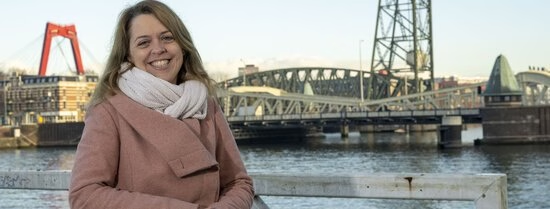What kind of family is best for a child to grow up in? Is our image of 'the ideal family' justified? Family scientist Amaranta de Haan researches children in different family structures. She is also an assistant professor in, among others, the Master's specialisation in Pedagogical Sciences: Opvoedvraagstukken in een diverse samenleving (Parenting Issues in a Diverse Society).
Her mission during the Master's is to teach students and soon to be pedagogues how to translate scientific knowledge into useful advice for caregivers. Amaranta: "Students discover during the Master's that it is quite an art to give advice without prejudice and which is scientifically based. That process is very nice to see."
The ideal family
From a young age, Amaranta was interested in differences between people and what role upbringing and background play in this. Her research delves into the influence that upbringing and environment have on your development. As a researcher, it is good to be aware of that influence, but also of the time and culture you grew up in, says Amaranta. It may be a time when people had a different 'normal'. Even today, in the Netherlands, the ideal family form is described as a heterosexual two-parent family: father, mother and child(ren) and then also from the white middle class. As a child, are you then less well off if one of the parents is no longer in the picture for whatever reason? Or if you grow up in a family with two mothers? Or in a family with a different ethnic background? Amaranta thinks this is too one-sided thinking. As is the assumption that the 'normal' family consists of a father, mother and child(ren). "That image emerged only in the 1950s. Before that, there were many different family forms, such as 'complex' families, compound families or single parent families."
Inclusive and co-creative research for 'new normal'
According to Amaranta, it is also a pitfall for researchers to think from such a normative framework. In other words, to implicitly assume that what is 'normal' is automatically also the best. Until recently, our scientific knowledge was primarily based on research on a very specific group of families: white, middle-class, heterosexual two-parent families. What we know about this group is not necessarily applicable to other family types," Amaranta explains. That is why Amaranta conducts inclusive and co-creative research among a diverse group of caregivers. How do children grow up in different family forms and in families with different backgrounds? How do caregivers raise children in these different types of families? And how can caregivers in various family forms be supported in their important parenting tasks? "
Parenting interview with an actor
Besides conducting research, Amaranta also teaches students, including those with the Master's specialisation in Pedagogical Sciences: Opvoedvraagstukken in een diverse samenleving (Parenting Issues in a Diverse Society). During the course? 'Growing up within the family', students learn how children develop within the family and how different family members mutually influence each other. "We teach students how to assess scientific knowledge and how to translate their knowledge into advice. Advice that caregivers who have a question about upbringing can benefit from," Amaranta explains. It is an instructive but also exciting subject for students. Often for the first time, they put the knowledge they have gained in previous years into practice. So from knowledge to skills. "Students first practice their conversation skills among themselves, later in the course they practice with a professional, and finally, as a final assignment, students conduct a counselling conversation with an actor. That actor plays, for example, the role of an parent/caregiver who asks how to deal with his son, who wants to serve alcohol at his 16th birthday party. Then, as a student, the first thing is to know how to assess results from scientific research: what evidence is there and how strong is this evidence? Then they have to translate that scientific knowledge into parenting advice, taking into account the background of the parent with whom you are having the conversation. Thanks to that practical translation of scientific knowledge into our education, students look back on it with great pleasure and appreciation." Amaranta is happy with that appreciation and how education in the Master's is designed. "By integrating knowledge, skills and professional formation, we teach our students to do their work with a critical and unbiased view."
- Researcher
- More information
This interview is part of Spark. With these interviews, we aim to draw attention to the positive impact of the faculty's education and research on society. The stories give an insight into what makes ESSB students, alumni, staff and researchers tick.
- Related education

